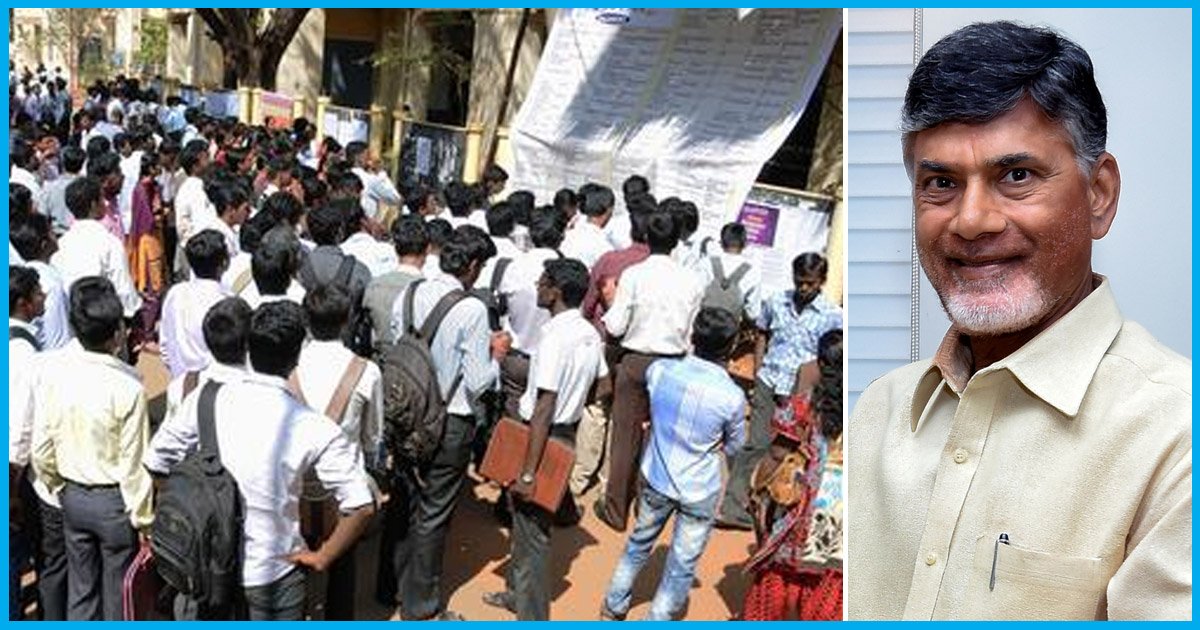
Andhra Pradesh Govt To Give Monthly Allowance Of Rs 2,000 To Unemployed Youth
18 May 2017 5:39 AM GMT
In a flagship move inspired by the concept of Universal Basic Income, the Andhra Pradesh government has decided to pay every unemployed youth in the state Rs 2,000 until they find a job. The scheme as launched by the Andhra Pradesh Cabinet Subcommittee on Wednesday, 17 May. It will have an initial budget of Rs 500 crore.
Giving unemployed youth financial assistance was mentioned in the ruling Telugu Desam Party’s (TDP) 2014 election manifesto. State Finance Minister Yanamala Ramakrishnudu, who heads the Subcommittee, said that steps are being taken by the Andhra government to impart skill development and training and create more job opportunities for youth.
Kollu Ravindra, Minister for Youth and Unemployment Benefits, told Indian Express that the programme would begin by the end of July this year.
He said, “We are still collecting data. There are approximately 12 lakh unemployed people in the state but we want an age-wise break-up. It needs to be seen if they have skills or not, and also, whether or not they are registered with the employment exchanges and bureaus. After collecting the data, we will be in a better position to frame a policy and decide how much amount each person should be given as unemployment benefit per month.”
The government said it would look at how states like West Bengal and Tamil Nadu are giving benefits to unemployed youths, analyse their impacts, and devise a suitable plan for Andhra Pradesh. Presently, West Bengal is giving Rs 1,000 to Rs 1,500 per person per month and Tamil Nadu is giving Rs 500 per month.
Sources said Andhra Pradesh may fix the monthly allowance at Rs 2,000. This monetary assistance will be for 2-3 years and only one unemployed person in a family would receive the benefits.
The concept of Universal Basic Income
Basic income is an idea to provide residents of a country with regular unconditional fixed amount of money. This can either be from the government or some other public institution, in addition to income received from other sources.
The concept of Universal Basic Income (UBI) is not a new one. Economists have debated it since 1797 when Thomas Paine proposed the idea. Since then, it has been experimented with in varying degrees by many regions and states in Scotland, Canada, Kenya, Uganda, and India. But never on a national level.
Finland began the first national UBI program on 1 January 2017. It is the first of its kind and will be observed eagerly by commentators around the world as it will provide conclusive proof of the merits or demerits of providing a universal basic wage for all citizens.
The scheme will continue for two years. Through it, 2000 randomly picked unemployed Finns (between ages 25 and 58) will receive a guaranteed sum of €560 ($806) per month – to be paid even if they find work.
The first UBI referendum in the world was held in Switzerland on 5 June 2016. It was rejected by a 76.9% majority. A nation-wide UBI scheme in Switzerland would have nearly doubled welfare spending. However, a similar proposal will be rolled out in the Netherlands soon, and the idea has also taken root in Italy.
The UBI debate
Proponents of a universal wage argue that it incentivises unemployed people to seek different jobs and, in the long run, cuts government spending on welfare schemes. Opponents of the idea argue that it is untested and costly, and say it could increase unemployment by ensuring an unconditional and steady flow of income.
There are many major proponents of UBI around the world. The idea’s future will be tied with how Finland fares in the next two years.
UBI in India
The Economic Survey of 2016-2017 proposed that the government adopt a UBI policy to alleviate poverty. The report stated:
- Universal basic income (UBI) should be seriously considered;
- UBI is an alternative to the several state subsidies;
- It can help in poverty alleviation;
- UBI would cost between 4% and 5% of GDP.
While several states have implemented UBI in varying degrees and forms – the latest being Andhra Pradesh – there is no national UBI policy in place as such.
Read more:
 All section
All section













